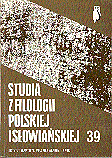Język narodowy jako wypadkowa procesów narodowotwórczych (reinterpretacja relacji język a naród w ujęciu Dubravka Škiljana)
National language as a resultant of nation-creating processes (reinterpretation of relations language vs. nation as presented by Dubravko Škiljan)
Author(s): Jerzy MolasSubject(s): Language and Literature Studies
Published by: Instytut Slawistyki Polskiej Akademii Nauk
Summary/Abstract: Complex ethnic situation aggravated by problems associated with status of languages of the particular ethnic and national groups of the former Yugoslavia in the last 30 years caused evolution of analyses of social and political aspects of functioning of the language, which were extremely important not only in the perspective of the Slavic languages. As the status of the Serbo-Croatian language was the source of most of controversies, majority of papers refer to that very problem. The latest book by a Croatian linguist, Dubravko Škiljan, Govor nacije (Zagreb 2002) offers a novel and interestingly inspiring interpretation of the issues. The book proposes the thesis which to a considerable degree relies on achievements of the Western sociolinguistics, especially that presented by J. Fishman. However, the undisputable merit is due to Škiljan for combining the theories functioning to date into a common and complex model that well explains the processes in which the Slavonic languages take their shape. The most important compounds of that model are: (1) Differentiation between the notions of communicational community/group, language community and national community, and also defining the relations and dependencies between the groups defined by those terms and notions. (2) Presentation of roles of elites in the process of formation of national languages. (3) Reversal of the perspective of description in which it is not the language that contributes to formation of a national community but the pursued by elites goal of the planned community is the most decisive factor in shaping the form and transformations of a given idiom.
Journal: Studia z Filologii Polskiej i Słowiańskiej
- Issue Year: 2004
- Issue No: 39
- Page Range: 285-300
- Page Count: 17
- Language: Polish

